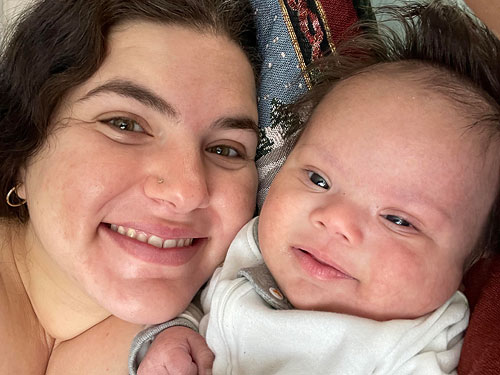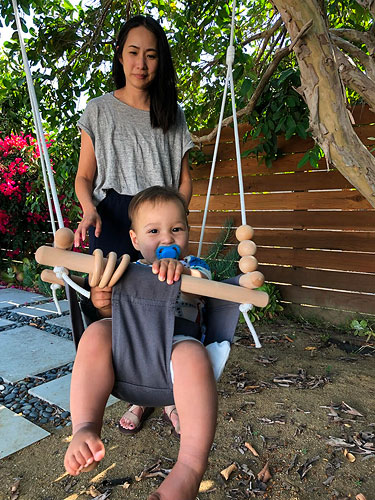The WGA’s Paid Parental Leave benefit steps in to help.
4/18/2025
Guild Stays on Top of AI Developments
Urges studios to “come off the sidelines.”
As the 2023 WGA strike progressed, Devon Balsamo-Gillis watched the months unfold both with excitement and with some fear. Gotham Knights, the show on which she had been a staff writer, was canceled mid-strike, and Balsamo-Gillis was pregnant with her first child. By the time the strike ended, she was weeks away from delivering her son, Honor, on November 2.
Honor was diagnosed with Down syndrome and had to return to the NIC unit for 17 days. Learning of the WGA’s Paid Parental Leave (PPL) benefit alleviated some of the pressure.

“Just knowing that I had that option at the end of the year and a little bit of next year to buy me some time to be with my baby, just having something as you’re bringing a new life into the world is such a relief,” says Balsamo-Gillis. “In our case, we were dealing with so much with having a medically complex kid, so having time to get used to that and set him up with everything just makes such a big difference in terms of stress.”
As of September 2023, 475 WGA members have used the Paid Parental Leave benefit, which resulted from the contract negotiations of 2020 and went into effect in May of 2021. According to the Writers’ Guild Industry Health Fund, 55% of the members using the benefit are male and 45% are female. 92% used the full eight-week benefit period.
Husband and wife WGAW members Juan Avella and Shelby Farrell were both eligible for WGA PPL. Between the WGA benefit and paid family leave through the state of California (which they received by being incorporated as an S-corp), Avella and Farrell received five and four months’ worth of benefits respectively. The payments began two weeks before the birth of their daughter Camila on May 31, 2023.

“It really was a lifesaver,” says Farrell. “We were able to get through the strike and focus on our baby and not so much on the fear of seeing our bank account dwindling down.”
Camila also had to spend time in the NIC unit and ended up having surgery. Between time spent on the picket line, Avella and Farrell were figuring out how to incorporate the arrival of the new baby into a routine with their then two-year-old daughter, Victoria.
“Just learning how to be a family with two kids has been a pretty steep learning curve,” says Farrell, a feature writer who wrote the Netflix feature Deidra & Laney Rob a Train. “Even after the strike ended, I think we’re still kind of figuring out how to juggle things.”
“They call it bonding time,” adds Avella. “It really does allow us to focus on the baby and her needs.”
When Justin Piasecki learned in 2021 that the WGA’s PPL benefit would be going into effect in May, he breathed a profound sigh of relief. He and his dentist wife, Michelle, were expecting their second child seven months later.
The pressure that had weighed on him before his first daughter, Sydney, was born had been lifted. Now Piasecki would have time to get to know his new baby, Nora, and have her get to know him. He could change diapers, and get up in the night when she cried, without worrying that distraction or loss of sleep would befuddle his brain for writing the next day.
“Those are unmissable months for your kids,” says Piasecki, who had been working on rewrites for directors Ron Howard and Martin Campbell, and writing Relay with David Mackenzie. “I didn't feel like there's a gun to the back of the head saying you’ve got to keep marching and find the next thing real quick. Instead of jumping into offers or pitches, I said, I'm not going to do anything. So, my wife and I were able to take off the first two months together.”

[The Paid Parental Leave benefit] really was a lifesaver. We were able to get through the strike and focus on our baby and not so much on the fear of seeing our bank account dwindling down.
- Shelby Farrell
The new provision is crucial in the U.S., since it is among only a handful of countries with no federally mandated paid downtime for parents anxious to bond with their newborns, and recover from the emotional upheaval and physical changes that follow the birth of a child.
The half of one percent additional contribution won in the 2020 MBA allows covered members to receive $2,000 a week during eight weeks of leave taken during the 12 months after a baby is born, adopted, or fostered. The weeks don’t need to be taken consecutively, but can be split into convenient increments. If both parents qualify, each can take advantage of the benefit, which can be used only once within a 12-month period. To be eligible, writers must have Writers' Guild-Industry Health Fund coverage on the date of a child’s birth, adoption, or formal fostering.

While California law offers parental leave benefits from the state for wage-earners, screen and television writers’ positions are largely freelance. The Guild had been trying for some time to obtain workplace benefits for new parent members ineligible for state funds.
WGAW Board member Nicole Yorkin remembers bringing the issue to the AMPTP when she was a member of the Guild’s 2017 Negotiating Committee that opened the door to the 2020 paid provision through an unpaid guaranteed parental leave. “We sat across from these executives, and as we told them our personal stories about why parental leave would be vital for writers to continue in their careers, you could see lightbulbs going on in their faces,” Yorkin says. “At a certain point, they actually said they were shocked to hear our stories, that we were in the 21st century and we as writers didn’t even have this most basic right.”
Before the benefit was negotiated, the Guild heard numerous tales from members who were new mothers and were asked to return to work immediately after having a baby. Yorkin and her writing partner Dawn Prestwich both tried to time their pregnancies and deliveries to coincide with series hiatus periods. Once she gave birth to her son, Yorkin recalls being pressured to return to work earlier than she had hoped to and setting up offices with a hired babysitter and her newborn son in a basket on the floor.
“In those days, the whole goal was to pretend like you were just the same as any man working on the show. Nothing happening in your life as a woman could get in the way,” Yorkin says, “So if I’ve got my three-week-old baby and if the staff is going out to lunch, then I’m going out to lunch with them and bringing my baby and putting him under the table and hoping that no one will notice or that he won’t wake up.”
Farrell thinks it is important that eligible men and non-birth partners take advantage of PPL to help send a message that women will not be the only ones taking time off.
“That’s a big thing when you look at the discussions online about paid parental leave,” says Farrell who is active with many WGA moms and women’s groups. “Men need to be taking it too or it becomes a reason that employers use if they don’t want to hire women who are having young families.”
Sarah H. Haught and her husband already had a one-year-old daughter when she became pregnant again in 2021. An Executive Story Editor on Bull during her first pregnancy, which was before the Guild negotiated the parental leave benefit, now Haught was Supervising Producer on Outlander. The showrunner and the crew were supportive, and her identical twin daughters, Emza and Mosby, were born as she was winding up season 7. But she was uncertain about whether there would be a season 8 for her to return to.
Other Guild moms (“A good network to be a part of,” Haught notes) made her aware of California state disability and parental leave benefits for which she could be eligible.
“You don’t generally think of pregnancy as a disability. It feels like one,” says Haught, whose show ended up being renewed. “But having the Guild parental benefits, as well [as the state], really did help me in what, luckily, ended up being the gap between two seasons, but very easily could have just been extra time where I was looking for work. It certainly eased the anxiety.”

Like Haught, Ning Zhou, a first-time mom who gave birth to a baby boy, Finn, in the summer of 2021, was working in a room when she had to take time off. A former Executive Story Editor on Kaleidoscope, Co-Producer on Ozark, and recently Supervising Producer on New Look, and co-EP on Lawmen: Bass Reeves, she appreciated the plan’s flexibility.
“I took maybe four weeks at the start,” she says. “I was fortunate enough that I was working for someone who was very understanding and willing to be flexible. When that job had finished, and I was in between jobs, I took another four weeks, so it really helped to take the stress off. It’s only until you’re in it that you realize it’s such a mental adjustment: a pretty dramatic lifestyle shift from not having a kid to having a kid. I think it takes a few weeks, if not a few months, to wrap your head around.”
There are, of course, benefit application forms to fill out.
“It was just super easy. Probably the easiest part of the parenting journey that I've experienced so far,” says Zhou,
For Piasecki—whose crime thriller Stakehorse sold this year to Amazon MGM Studios—there was a secondary bonus to the time he was able to spend with baby Nora: Paid Parental Leave also gave him precious hours to help two-year-old Sydney adjust to the new little scene-stealer who had entered her world.
“It really does make a difference, feeling like the WGA is a lifelong partner in your career,” says Piasecki, adding that the benefit enriched his family’s life. “I hope that everyone becomes aware of it, or continues to be aware of it. There's absolutely no downside to making sure you do the paperwork and take advantage of it.”
“I was so happy we were able to get this benefit for writers,” adds Yorkin, “and I hope it’s made a huge difference.”
Once an eligible member declares a new dependent, they can expect to receive a Paid Parental Leave enrollment package. If for some reason one doesn’t arrive, they can contact the Health Fund at (818) 846-1015 or toll-free (800) 227-7863, or they can email Pmailbox@wgaplans.org.